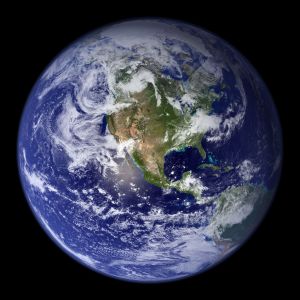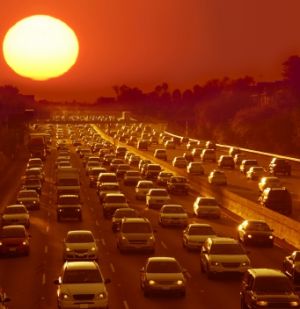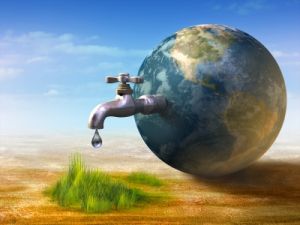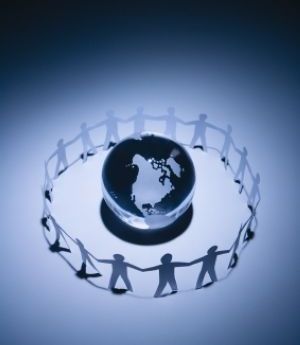So What Can We Do?
I think we often take the influence that technology has on us for granted, maybe because many of us have known no other way of life. Make no mistake, it has changed us. Our technologies have essentially become an extension of ourselves. Think of a man operating a backhoe. Basically, he is surrounded by heavy armour with an arm 1000 times as strong as any human - an exoskeleton. Our airplanes allow us to leap over oceans. Our cars enable us to run 10 times faster, and 100 times longer than we could have ever imagined. Our communication systems allow us to talk to neighbours on the other side of the world, whereas in the past, we could only do so as far as we could shout. We have advanced science significantly, to the point where we can measure the universal physical laws that govern us. This has allowed us to create complex alloys, to power space ships to the moon, and to create medicines to cure us. Technology has enabled us to become a race of super beings with the ability to change the world, incomparable to any other life forms we are aware of.

In so doing, we have virtually been given a magic wand to get whatever we want. It seems though, that for each wish, there are side effects that affect Life and Earth. As we play with our wand, we have seen side effects like global warming, excessive consumption of resources, and contamination of our environment. How many more lessons must we have in order to learn that we must be more careful? To me, it has become clear that we have come to a juncture in the evolution of life on this planet. It is all happening too fast. It takes tens of thousands of years for ice ages to occur. Deadly comets come to our planet maybe once in 100,000 years, but in only 100 years we have found ways to create potentially similar disasters, and maybe even greater ones in the near future. If the Earth were a 1000 times larger, or we were living on 1000 different planets, the potential risk to us as a species might not be as great, but this is not the case. We are living on ONE irreplaceable, fragile, planet that is taking a beating as we extract the life from it. We are taking it out of its evolved natural balance and we are out of control. It is a mistake for us to be fighting and discriminating between ourselves while we threaten the Earth and the survival of Life. We have great challenges that we have to face on this planet, yet as this occurs, we still seem to find reasons to disagree on so many things.
It seems that we need to work toward a global mindset. A mindset that emphasizes what we have in common, and not how we are different. We need to accept ourselves as, not only individuals or countries, but as part of one entity. We need to consider the concept that, while each of us, as individuals or countries, has unique valuable differences and ideologies, we can find greater strength to tackle the problems of the future by working with one another. I don't see any other way to contend with the risks that we are about to face. If we are to wave our magic wand, we must do it together, so that no part of us can wish us all away, whether intentionally or by accident.
The following are only a few suggestions that may help us adapt to our changing world, but I have to emphasize again, that these are only specific problems that we might focus on. Ultimately, even more important than these specific problems, is how the countries of our planet come to work together to implement solutions and prevent problems from the side effects of our technologies. This is why my first suggestion that "Influential Countries Must Unify" is at the top of the list.
1) Influential countries must unify - We must understand our differences and work together
I consider this the most important action that we must take, because it deals with the root of the problem, and all others stem from it. It seems that the world powers like the U.S.A., China, Russia, and others that might be willing, must cooperate. They need to collectively establish global policies, accept responsibility, and confront the challenges we face now, and in the future. It is good that we have cultural differences, and these can be maintained, but we need a more reliable way for NATIONS of the world to brainstorm together on world issues, and implement global policies based on a Universal Philosophy. The United Nations has great intent, but it simply does not yet seem to have the influence that is required to resolve the problems related to the side effects of our technologies.

It would be wonderful one day to see the leaders of world powers like Russia, China, India, the U.S.A., the European Union, and any others that might be willing, get together at a table and take a moment to see each other in a different light. Instead of seeing their differences and how they might compete with each other for resources, ideologies, and power, they would see that preserving the Earth is their greatest challenge now. They would see the person beside them as being much the same, a part of their community. In so doing, their intent would be to help each other instead of trying to gain supremacy economically, in power, or beliefs. It might require compromise, but it would be for the benefit of all. They would learn about what they have in common and accept many of their differences respectfully. For example, rather than assume how we are different under the capitalist and communist systems, they would focus on what they could learn from their differences. They would see common visions of how the world could move forward as one, such as exploring the stars together, rather than making it a race to see who could place their flag and claim a new planet first.
My hope is that the world leaders will realize that they have been given the paintbrush and a palette of endless colours to change our world. Together they could take on the new role as artists of the planet, and paint a well thought out painting of the future for Life and Earth. I think of the amazing things they could do with a global mindset. They could implement policies that in a moment would:
-
Combine scientific efforts and share knowledge, rather than hide it from one another. In so doing, as a group, we could better control the spread of new technology, setting policies on how and at what rate we develop it, so as to ensure the best welfare for Life and the Earth.
-
Look at areas of poverty in the world, and as a group, take a controlled approach in various regions in order to help stabilize population growth and improve their life style. They could offer medicines, education, and technologies that would minimize the disparity between the technological HAVES and HAVE NOTS.
-
Incorporate into education programs a Universal Philosophy, encompassing knowledge of global concerns that affect all of us. This would include education on the importance of caring for other life, and the Earth. For example, Denmark includes education of global issues in their programs.
-
Set laws to protect the environment - the Earth. Countries could universally set policies to allow the fish to repopulate the oceans and thrive as they once did. They could set policies to allow our devastated forests to grow again, protect ecosystems and species that are endangered, and ensure our fresh water stays pristine, and that our atmosphere is pure. They could immediately set policies to react to global issues like global warming, excessive resource consumption, and excessive population growth.
-
Better enable them to collectively work as allies in order to neutralize confrontational disputes with groups who had available to them advanced technologies that might impact life and the planet in negative ways.
-
They could set policies to help resolve injustices against humanity such as torture, slavery, and other acts that might be considered unethical. Similarly, they could apply and enforce laws that would ensure the welfare of other species.
2) We must take responsibility and protect what we have
For a moment think of the Earth again as a painting. Instead of having been given a magic wand through our technology, we have been given a paintbrush and we are the artists - the creative artists of the painting. At one time it was a blank piece of canvas like the moon - a barren planet as described in the preface. Somehow in the past it was endowed with lush forests, blue skies, fresh air for us to breathe, and an abundance of colourful species and vegetation scattered all over it. How this happened is not important at this point. More important, is that so far we have dulled the colours of the painting by killing species, destroying ecosystems, depleting resources, and contaminating the skies. This once colourful painting is losing its colours, tending toward a blur of grey, not so different than the surface of any barren planet.

As the creative artists, we have the technology. It is the paintbrush and the paint, but do we have the vision and sense of responsibility to take care of the beautiful work that has evolved as a part of Nature - and build upon it? With our technology we can protect what we have and we can allow it to flourish. We have made efforts but they seem modest. For example, we have created wildlife reserves to protect the destruction of animal species and ecosystems. We have attempted to change our energy consumption to other options such as to electricity, or solar power, as opposed to coal and oil which may be harming our atmosphere. We need to work harder though, and our actions must be taken as a global unified effort. We must take responsibility and, as we paint, we must be very careful not to destroy the work that was done before us. The creations that were painted by Nature are so important to our future.
In the grand scheme of things, it might seem insignificant to lose some rare butterfly species in the Amazon, especially when one considers that species have come and gone through the eons. After all, who would really know or care? Is it not just the survival of the fittest anyway, and hence, if a species becomes extinct, is that not the way it was meant to be? Imagine for a moment though that the butterfly species is like a loss of a colour on the painting called Earth - maybe it is a light hue of blue and purple, hardly noticeable. Nevertheless, the colour is a part of the entire painting, and the loss of the colour ultimately affects the entire piece of work, not just a small spot. This is not so unlike the idea that the loss of one species can affect the balance of an entire ecosystem. It is one thing for the species to fade as a result of the evolution of Nature. It is another thing for us to use our technological advantage to wipe out a species to service our indulgent demands for immediate pleasure. I imagine it will be difficult one day for future generations to understand why we risked causing elephants to become extinct so that we could make profits from selling trinkets made from their tusks. I imagine it will be difficult to explain why we killed sharks so that we could eat their fins, or why we overfished our waters so that we could feed the indulgent desires of an out of control population.

Imagine for a moment that you have lost everything. You are alone on a planet covered with sand and rock. There are no trees, no water - only a desert. There is nothing. There is no trace of other Life - but you live. For days you go on, wondering why you would even want to live in such emptiness. The canvas on your painting is one colour - grey and empty like a desolate moon.
Then one day you are amazed. You see a butterfly with great blue wings, speckled with what seem to be black dots. The sunshine reflects from its wings. The butterfly moves its wings slowly up and down and takes flight. For a moment, this wonderful gift of colour has rested on your desolate grey painting. Then you realize that the butterfly was once the one that you might have allowed to be taken to extinction in the Amazon without a second thought. Must we be in the absence of the colour of the butterfly - the colours of life - before we realize their value to our existence?
We must care for other plant and animal species and their ecosystems. We must care for the water and the air. They touch our senses - our sight, our smell, and our taste. They are the colours on the Earth to which we are so connected because, at our deepest level, we are a reflection of all these beautiful things. One day, when we might live in a world of cement and machines, we may finally realize that, in losing the diversity and purity that Nature gave us, we have lost the things that brought us some of our greatest pleasures - the colours in our lives. Just because we have been endowed with an abundance of beauty and colours, this does not make it right to waste and abuse it. We should not be blinded by all that we have, just so that we might destroy it to fill our indulgent needs.
We have accepted the paintbrush, the great powers of technology, but can we take responsibility for the future? Can we find it in ourselves to care for all Life and the Earth? We may have become the creators of our own destiny, but still we are only subjects of Nature and the universe. Will we find the knowledge and wisdom necessary to protect what we have, and what we are?
3) We must acknowledge population growth as a source of many of our problems

In order to resolve problems like natural resource depletion and contamination of our environment, we are creating endless technologies that might make things better. For example, we are using alternate forms of energy other than fossil fuels such as electricity, solar, wind, and nuclear energy. We are also finding other solutions to help fill the vast needs of our growing populations like desalination plants to convert the ocean water to fresh water, fish farms to help replace our depleted supplies of wild fish, and so on.
Just for one moment, imagine that we had 20% of the people in the world, maybe not so different than when the Native Indians inhabited North America? Would we have many of the resource depletion and contamination problems that we have today? Can anyone say whether there is a right or wrong population for the Earth? There are over 8.0 billion (2022) humans on the planet. This is estimated to become about 9.7 billion by 2050. Should we just keep extracting resources and put out waste until the population is 10 billion or 15 billion? Should we just wait to see what happens with the world population?
I find it interesting that we continue to focus primarily on ways of making it possible for Earth to sustain more people. Our unwritten objective seems to be to keep finding technology and resources so that we can continue to provide for our growing population. Population control may be something we do not want to do, but it may become one of the compromises we need to make in order to maintain a balance for the Earth. Besides, as discussed earlier, we may be able to encourage population control willingly by assisting developing countries to become more developed and educated (demographic-economic paradox).
In China, though there were many repercussions, they had taken an initiative by implementing the one-child-policy that applied to about 35% of the population. "China's one-child policy has the indirect consequence of reducing China's total ecological footprint and thus reducing strain on ecological resources." (Wikipedia). In 2015 the one-child policy was changed to a two-child policy which allows Chinese couples to have two children. This was meant to address the issue that a larger percentage of the population of China is aging.
In a sense, it might be contradicting the traditional way of Nature by making an effort to control population with our technology (e.g. education and birth control). We are not bacteria in a petri dish though, reproducing till all the food is consumed. We are human beings that can plan intelligently for the future as a part of our adaptive process. Besides, we changed the playing field a long time ago when we created technology to allow us to populate the Earth at an incredible rate. Is it possible that the evolutionary process of Nature never accounted for the fact that a species would come up with such intelligence that it could strip the Earth and dominate it so rapidly? Maybe we are due to use our intelligence to reverse engineer some of changes we have created, including population growth.
4) Reducing per capita consumption

Resource consumption (e.g. depleting the stock of fish in our oceans, deforestation, depleting fresh water, maximizing out our arable land for farming) and associated waste (e.g. increasing co2 levels) is putting a great strain on the Earth. Let's take a look at some information from Wikipedia regarding per capita energy consumption in the various countries of the world:
"Energy consumption is loosely correlated with gross national product, but there is a large difference even between the most highly developed countries, such as Japan and Germany with 6 kW per person and United States with 11.4 kW per person. In developing countries such as India the per person energy use is closer to 0.7 kW. Bangladesh has the lowest consumption with 0.2 kW per person. The US consumes 25% of the world's energy (with a share of global productivity at 22% and a share of the world population at 5%). The most significant growth of energy consumption is currently taking place in China, which has been growing at 5.5% per year over the last 25 years. Its population of 1.3 billion people is consuming energy at a rate of 1.6 kW per person." (Wikipedia)
The above is a fair bit of numbers to absorb, so summarizing, it basically suggests:
-
The U.S. has in the last few years been by far the largest per capita consumer of resources with US per capita consumption in some cases over 8 times that of many developing countries (11.4kw US/1.6kw CHINA = approximately 8 times).
-
Nevertheless, other developed countries like Japan and Germany seem to consume approximately 1/2 (6 kw JAPAN/11.4kw US) that of the US. This indicates that in North America there is definitely room to reduce per capita consumption habits relative to other developed countries.

-
One main observation from the above is that developing countries (which includes China), represent over 70% of the world's population. They have the greatest growth in per capita energy consumption. Even if North America (5% of the world's population) reduces per capita consumption, it will have only a minor affect on overall worldwide per capita energy consumption in the future. Consider China and India, with a combined population of nearly 10 times that of the US. If they were simply to double their per capita consumption (e.g. China 1.6 kw to 3.2 kw), it would result in a much greater overall world consumption of energy, even if the US were to match European levels. Over the next few decades, as developing countries gain access to technologies that require energy and resources, average world per capita consumption will remain steady, and possibly even increase further.
Imagine yourself living in a developing country subject to disease and contaminated water, washing your clothes in a river, and living in the cold. Then imagine how nice it would be to know that one day you might have available to you fresh running water, a refrigerator where you could keep your food, and a laundry machine to wash your clothes. I believe, over the next few years, that developing countries, quite understandably, will place their focus on attaining such basic luxuries. This will mean an increasing overall demand for world resources, and associated waste.
5) Creation of clean energy and clean technologies

We have discussed some actions that humanity must consider, such as taking on more responsibility, possibly considering population control, and also attempting to minimize per capita consumption of resources. Now consider the option to change the resources we consume to ones that will be more environmentally friendly.
It should be a priority of the developed countries to aggressively research and develop cleaner technologies that can be available to both developed (U.S.A., Europe, Japan) and developing countries (Asia, Africa). Probably the most important, is to create new energy sources available to all populations that are efficient, safe, and clean, as opposed to the burning of our forests, oil, and coal.
It all comes down to ... We must work together
In summary, it is difficult to determine where the solutions lie in preserving the Earth. Education on population control, reducing per capita consumption, and creating new useful technologies that improve living conditions and do not harm our environment, are a few options. It is one thing for us to be aware of the problems and solutions (the branches of the tree) but how do we implement solutions when countries have different policies and agendas? The question is not what the solutions are, but how can we effectively implement the solutions on a global scale?

I have outlined a few of the ways that the side effects of technology impact us, emphasizing that:
-
There is an urgency to deal with the current and potential new side effects resulting from our technologies.
-
We cannot just hope that things will work out. We are the artists and we hold the paintbrush. We must TAKE RESPONSIBILITY TOGETHER.
-
The real problem is not in determining the solutions. It is in determining how to work together to implement the solutions.
Why do the countries of the world have so much difficulty collectively implementing solutions that might resolve our problems? If we can better understand our place in this universe, we may be able to create a common vision to help us work toward implementing these solutions. How do we want our world to be in 10 years, in 50 years, or 100 years?
We have put ourselves in the driver's seat and we can no longer hope that Mother Nature will look after us. Together, we must take a deep look at our existence and set specific goals to create the future we want for Life and Earth. We need a Universal Philosophy, a set of values, that may help steer us toward a safer path that will ensure our survival and happiness. It does not mean that we need to lose our different ideologies and cultures. These are a part of the diversity and colour of our world. It only means that we need to find some common ground that will help us work together and protect our home - the Earth. Ultimately, with respect to whatever ideals we may live by, I hope we can find a way to teach and implement a Global Universal Philosophy that encourages a strong concern over the welfare of Life and Earth, so that we can create the best future possible.
How do we find the future that we desire?

Up to this point I have discussed many problems that have occurred due to our growing technologies. I have also proposed that cooperation, or integration between countries, is a critical step toward dealing with existing problems and the new ones we likely have yet to face. The remainder of this book will deal with the big question of how to take us from where we are, to the future that we would like to see for ourselves. In order do this, we need to explore the nature of human beings. We must understand the reasons why we have differences that prevent us from working together toward the goal of global unity.
In the next section called UNDERSTANDING OURSELVES, I discuss the concept of "Destiny". Before considering the future, we really must decide whether the future is already written, or whether we do have the ability to shape it ourselves.
Next, in the same section called UNDERSTANDING OURSELVES, I look deeper into the unique qualities of human beings that make them different from other creatures. The main one is the ability of abstract thought. This may be a large factor in explaining why humans have so many different beliefs and interpretations of reality. This is very important because different beliefs are often why human beings and countries cannot work together. For example, many countries have conflicts over different religions, over patriotism, and their beliefs of right and wrong.
The discussion on "Reality", also in the section called UNDERSTANDING OURSELVES, attempts to give one interpretation of reality and what we are within it. It goes further, to discuss the nature of our "Consciousness", and what our consciousness is in the reality that we perceive we are a part of. If we can better understand what we are, what life is, and what our purpose is, if there indeed is one, then it becomes much easier for us to set unified goals and plan for the future of Life and Earth.
In the section called UNDERSTANDING CONFLICT, I look at the specific reasons why we have trouble working together, such as conflicting belief systems and economic interests. I also discuss in detail the nature of cooperation and competition. It is important to understand in what situations cooperation is necessary, and if the technological side effects created by humankind warrant us to make a shift toward cooperation from competition in order to ensure the welfare of Life and Earth.
In the section called SOME FINAL THOUGHTS, I am more specific about the actions that humankind might take to ensure a bright future for Life and Earth. Emphasis is on how to implement a global education system (GES) that is credible, accurate, and accessible to all countries on the planet.
